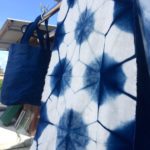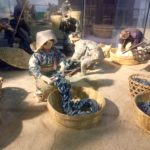
A 10 day training organised by @leafluberon in Tokushima, Japan, at the @Buaisou-i workshop. An eagerly anticipated trip which went way ahead of my expectations. Filled with people passionate about indigo, natural dying practices, sustainability, life and slow fashion; it was an experience I will treasure for the years to come! You can also find out more about this experience on the Mei Line instagram account @Mei.Line.Design @Buaisou-i is an indigo dyeing workshop and slow fashion creator but also an indigo farmer: the concept is «From farm to closet». On top of the indigo dying and reserve techniques, we learned about the traditional Japanese indigo vat making named Aidate. We also visited several local workshops all rooted in local traditions but with a very modern edge that seriously…
+



